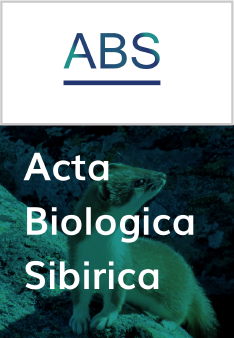Аннотация
Cousinia pterocaulos (C.A. Mey.) Rech. f., is an endemic species of the Asteraceae family in Iran and Transcaucasia, which is naturally distributed in northern regions of Iran. In the current study, we evaluated the composition of essential oil, total flavonoids and phenolic compounds, and free radical scavenging activity of C. pterocaulos extract. Plant materials were collected from a natural population of C. pterocaulos in Mazandaran, and identified based on description provided in Flora Iranica. Essential oil from aerial parts of this plant was extracted using Cleavinger type apparatus and analyzed its composition using GC and GC/MS apparatus. Moreover, the methanolic extracts from aerial parts were used to determine its total flavonoid and phenolic compounds and also capacity in scavenging the stable DPPH free radicals. The results indicated that total phenolic and flavonoids contents in this species is relatively small compared with other Cousinia species. Meanwhile, its capacity in scavenging free radicals is relatively higher than other species that were reported in previous studies. Furthermore, the main essential oil composition was 4,6-Heptadiyn-3-one (43.8%), which has not been detected in other Cousinia species. These findings revealed that each Cousinia species has a specific phytochemical property, leading to a unique biological activity.
Литература
Ahmed SI, Hayat MQ, Tahir M, Mansoor Q, Ismail M, Keck K, Bates RB (2016) Pharmacologically active flavonoids from the anticancer, antioxidant and antimicrobial extracts of Cassia angustifolia Vahl. BMC Complementary Medicine and Therapies, 16: 460. https://doi.org/10.1186/s12906-016-1443-z
Amiri MS, Hosseini HA, Rajai P (2014) Preliminary investigation on phytochemical composition and anti-bacterial activity of the root of Cousinia microcarpa Boiss. Asian Journal of Pharmaceutical Research, 4(4):156-159.
Andreu L, Nuncio-Jáuregui N, Carbonell-Barrachina ÁA, Legua P, Hernández F (2018) Antioxidant properties and chemical characterization of Spanish Opuntia ficus-indica Mill. cladodes and fruits. Journal of the Science of Food and Agriculture, 98: 1566-1573. https://doi.org/10.1002/jsfa.8628
Baliyan S, Mukherjee R, Priyadarshini A, Vibhuti A, Gupta A, Pandey RP, Chang CM (2022) Determination of antioxidants by DPPH radical scavenging activity and quantitative phytochemical analysis of Ficus religiosa. Molecules, 27: 1326. https://doi.org/10.3390/molecules27041326
Calixto JB (2019) The role of natural products in modern drug discovery. Anais da Academia Brasileira de Ciências, 91(Suppl. 3): e20190105. https://doi.org/10.1590/0001-3765201920190105
Clarke G, Ting K, Wiart C, Fry J (2013) High correlation of 2, 2-diphenyl-1-picrylhydrazyl (DPPH) radical scavenging, ferric reducing activity potential and total phenolics content indicates redundancy in use of all three assays to screen for antioxidant activity of extracts of plants from the Malaysian rainforest. Antioxidants, 2(1):1-10. https://doi.org/10.3390/antiox2010001
Iranshahy M, Tayarani-Najaran Z, Kasaian J, Ghandadi M, Emami SA, Asili J, Chandran JN, Schneider B, Iranshahi M (2016) Highly oxygenated sesquiterpene lactones from Cousinia aitchisonii and their cytotoxic properties: Rhaserolide induces apoptosis in Human T Lymphocyte (Jurkat) cells via the activation of c-Jun n-terminal kinase phosphorylation. Phytotherapy Research, 30(2):222-226. https://doi.org/10.1002/ptr.5519
Mahdieh M, Talebi SM, Akhani M (2018) Infraspecific essential oil and anatomical variations of Salvia nemorosa L.(Labiatae) populations in Iran. Industrial Crops and Products, 123: 35-45.https://doi.org/10.1016/j.indcrop.2018.06.061
Marco JA, Sanz JF, Albiach R, Rustaiyan A, Habibi Z (1993) Bisabolene derivatives and sesquiterpene lactones from Cousinia species. Phytochemistry, 32(2):395-400. https://doi.org/10.1016/S0031-9422(00)95002-7
Meng XH, Liu C, Fan R, Zhu LF, Yang SX, Zhu HT, Wang D, Yang CR, Zhang YJ ( 2018) Antioxidative flavan-3-ol dimers from the leaves of Camellia fangchengensis. Journal of Agricultural and Food Chemistry, 6: 247-254. https://doi.org/10.1021/acs.jafc.7b04572
Naeem A, Abbas T, Ali TM, Hasnain A (2018) Essential Oils: Brief Background and Uses. Annals of Short Reports, 1(1): 1006
Noori M, Talebi SM (2017) A chemotaxonomic study of some Iranian Linum Taxa. Phytologia Balcanica, 23 (1): 23-29
Noori M, Talebi M, Nasiri Z (2015) Seven Amaranthus L. (Amaranthaceae) Taxa Flavonoid Compounds from Tehran Province, Iran. International Journal of Modern Botany, 5(1): 9-17
Petrovska BB (2012) Historical review of medicinal plants' usage. Pharmacognosy reviews, 6(11): 1-5. https://doi.org/10.4103/0973-7847.95849
Paşayeva L, Eruygur N, Ayaz F, Tugay O, Fatullayev H (2020) Assessment of the antioxidant and enzyme inhibition activities of Cousinia iconica with focus on phytochemical investigation by LC-MS/MS, Plant Biosystems - An International Journal Dealing with all Aspects of Plant Biology. https://doi.org/10.1080/11263504.2020.1829736
Rechinger KH (1986) Cousinia: morphology, taxonomy, distribution and phytogeographical implication. Proceedings of the Royal Society of Edinburgh 89 B: 45-58. https://doi.org/10.1017/S0269727000008897
Sadgrove NJ, Padilla-González GF, Phumthum M (2022) Fundamental chemistry of essential oils and volatile organic compounds, methods of analysis and authentication. Plants, 11. https://doi.org/10.3390/plants11060789
Salimi-Sabour E, Shirazi FH, Mahboubi A, Mojab F, and Irani M (2021) Biological activities and the essential oil analysis of Cousinia harazensis and C. calocephala. Iranian Journal of Pharmaceutical Research, 20 (3): 140-150
Shahverdi AR, Khorramizadeh MR, Attar F, Saadat F, Vahid S, Ghahraman A (2007) Concomitant chemopreventive and antibacterial effects of some Iranian plants from the genus Cousinia (Asteraceae). Revista Brasileira Farmacognosia, 17(3):325-330. https://doi.org/10.1590/S0102-695X2007000300004
Singh KN (2012) Traditional knowledge on ethnobotanical uses of plant biodiversity: a detailed study from the Indian western Himalaya. Biodiversity: Research and Conservation 28(1):63-77.https://doi.org/10.2478/v10119-012-0028-z
Thirugnanasambandan V, Kannayiram S (2020) Phytochemical analysis and Antioxidant activity of Cousinia azmarensis. International Journal of Advanced Research Trends in Engineering and Technology, 7(1):4-11.
Talebi SM, Behzadpour S, Matsyura A (2019) Morphological and essential oil variations among Iranian populations of Salvia chloroleuca (Lamiaceae). Biosystems Diversity, 27(3): 233-237. https://doi.org/10.15421/011932
Talebi SM, Nohooji MG, Yarmohammadi M (2017) Short Communication: Infraspecific variations in essential oil compositions of Nepeta fissa from Iran. Nusantara Bioscience, 9: 318-321. https://doi.org/10.13057/nusbiosci/n090313
Talebi SM, Nohooji MG, Yarmoohammadi M (2020) Essential oil analysis of eight Nepeta taxa in Iran. Mediterranean Botany, 41(1): 43-53 https://doi.org/10.5209/mbot.64567
Tekin M, Özek G, Martin E , Özek T, , Yilmaz G, Hüsnü K , Başer C (2018) Essential oil characterization of Cousinia sivasica Hub.-Mor. (Asteraceae). Biological Diversity and Conservation, 11(2): 16-21
Tuzlac E (2011) Wild food plants and herbal dishes of Turkey. Istanbul, Turkey: Alfa Yayınları.
Yarmoohammadi M, Talebi SM, Nohooji MG (2017) Infraspecific variations in essential oil and glandular trichomes in Nepeta heliotropifolia. Biodiversitas, 18: 964-970. https://doi.org/10.13057/biodiv/d180314

Это произведение доступно по лицензии Creative Commons «Attribution» («Атрибуция») 4.0 Всемирная.


